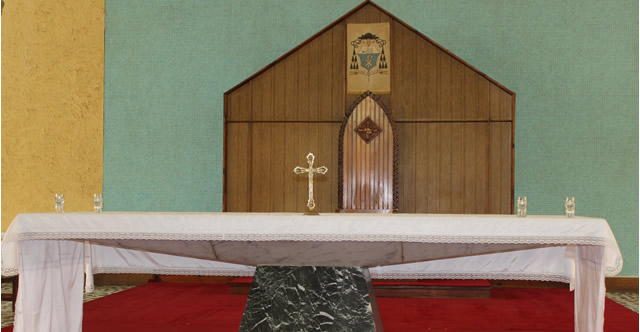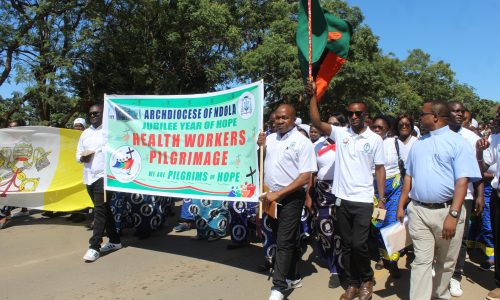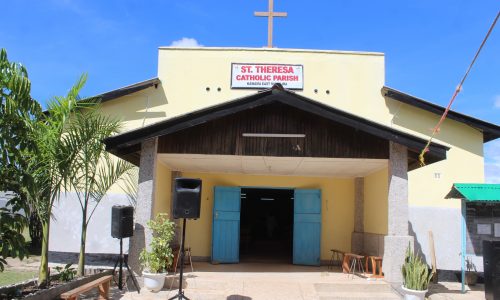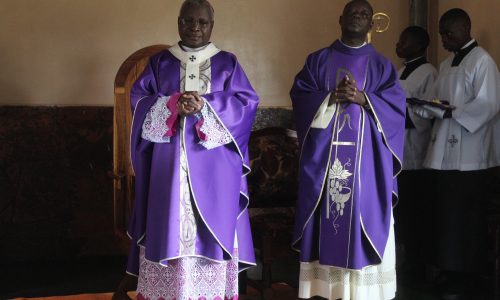VACANCY OF THE EPISCOPAL SEE
VACANCY OF THE EPISCOPAL SEE BECAUSE OF THE TRANSFER OF THE DIOCESAN BISHOP:
A note on some of its administrative implications within the Diocese.
- INTRODUCTION
On 30th January 2018 the Apostolic Nunciature in Zambia intimated to His Lordship Bishop Alick Banda of his transfer from the Catholic Diocese of Ndola to the Archdiocese of Lusaka. This event has caused a situation which is known in Church Law (Canon Law) as the Vacancy of the Episcopal See.
In this short article, we intend to remind all the Catholic faithful in the Diocese of Ndola of what Church Law (canon law) prescribes in relation to the life and administration of the Diocese under the prevailing situation.
Canons 416-430 of the Code of Canon Law provides norms for diocesan governance in case of a vacant see which takes effect only when there is no coadjutor bishop in the diocese, as it is the case for our Diocese of Ndola
- HOW DOES THE EPISCOPAL SEE BECOME VACANT?
The diocese is considered to be vacant as a result of one of the four circumstances stipulated in canon 416:
– by the death of the diocesan Bishop,
– by his resignation accepted by the Holy See,
– by deprivation notified to the Bishop,
– by transfer.
In case of transfer, canon 418 §1 prescribes that the episcopal see is strictly speaking vacated when the bishop takes possession of the new see, which is supposed to be done within Two months of receiving certain notification of transfer.
- GOVERNANCE OF THE DIOCESE AFTER CERTAIN NOTIFICATION OF TRANSFER OF THE DIOCESAN BISHOP
Before the canonical possession of the new diocese his present diocese is not technically vacant, but he loses the power of a diocesan bishop and immediately obtains instead the power of a diocesan administrator.
This means concretely that bishop Alick Banda is currently the diocesan administrator of the Catholic Diocese of Ndola, until the day he is going to take canonical possession of the Archdiocese of Lusaka or if in the meantime the new bishop of Ndola is appointed and takes possession of the see.
The reception of the certain notification of transfer (just as in the other circumstances that causes the vacancy of the episcopal see) brings about the cessation of the vicarious office (that of the vicar general and episcopal vicar), as stated in canons 418 §2, 1֯ and 481 §1, except the Judicial Vicar and his Associates as prescribed by canon 1420. The Treasurer General and other diocesan curia staff also continue in their offices.
- INTERIM GOVERNANCE OF THE DIOCESE AFTER THE TRANSFERRED BISHOP HAS TAKEN POSSESSION OF THE NEW SEE
In the event that the transferred bishop takes possession of his new diocese while the Holy See has not yet appointed a new bishop for the diocese where he is coming from, the governance of the vacant diocese devolves upon the auxiliary bishop, if there is one. Otherwise, it devolves upon the college of consultors (Cf. canon 419). Thereafter, the college of consultors will have eight days during which to elect the diocesan administrator (Cf. canon 421 §1). The person elected as diocesan administrator will be required to notify the Apostolic See of his election as soon as possible (Cf. canon 422).
During the vacancy of the episcopal see, it is of extreme importance to note the prescription of canon 428 §2 which states that: “Those who have the interim governance of the diocese are forbidden to do anything which could in any way prejudice the rights of the diocese or of the Bishop. Both they, and in like manner any other persons, are specifically forbidden to remove, destroy or in any way alter documents of the diocesan curia, either personally or through another.” In other words, during the vacancy of the episcopal see, no innovations can be made in the diocese.
- CONCLUSION
Despite the announcement that His Lordship Bishop Alick Banda has been transferred to the Archdiocese of Lusaka, the diocese of Ndola is not in any way experiencing a vacuum in its administration. The ordinary day to day life of the diocese continues. The Bishop Administrator will continue looking into the affaires of the diocese.
During the absence of the Bishop Administrator, the affaires of the diocese will be taken care of by the Director of Pastoral Programmes, the Treasurer General and the Judicial Vicar.
Our immediate former vicar general has been retained as the bishop’s personal secretary and will be carrying out the duties assigned to him by the bishop administrator.
Prepared by:
Rev. Fr. Francis Mukosa,
Associate Judicial Vicar,





3 Replies to “VACANCY OF THE EPISCOPAL SEE”
Very insightful piece! Its always refreshing to see such well-researched articles. I’d love to discuss this topic further with anyone interested. Check out my profile for more engaging discussions.
Yangın çıkış kapısı fiyatları, kullanılan çelik ya da alüminyum gibi malzemeler ve dayanıklılık seviyesine göre farklılık gösterir. İstanbul’da çeşitli seçenekler bulunmaktadır.
Im obliged for the blog article.Really looking forward to read more. Much obliged.